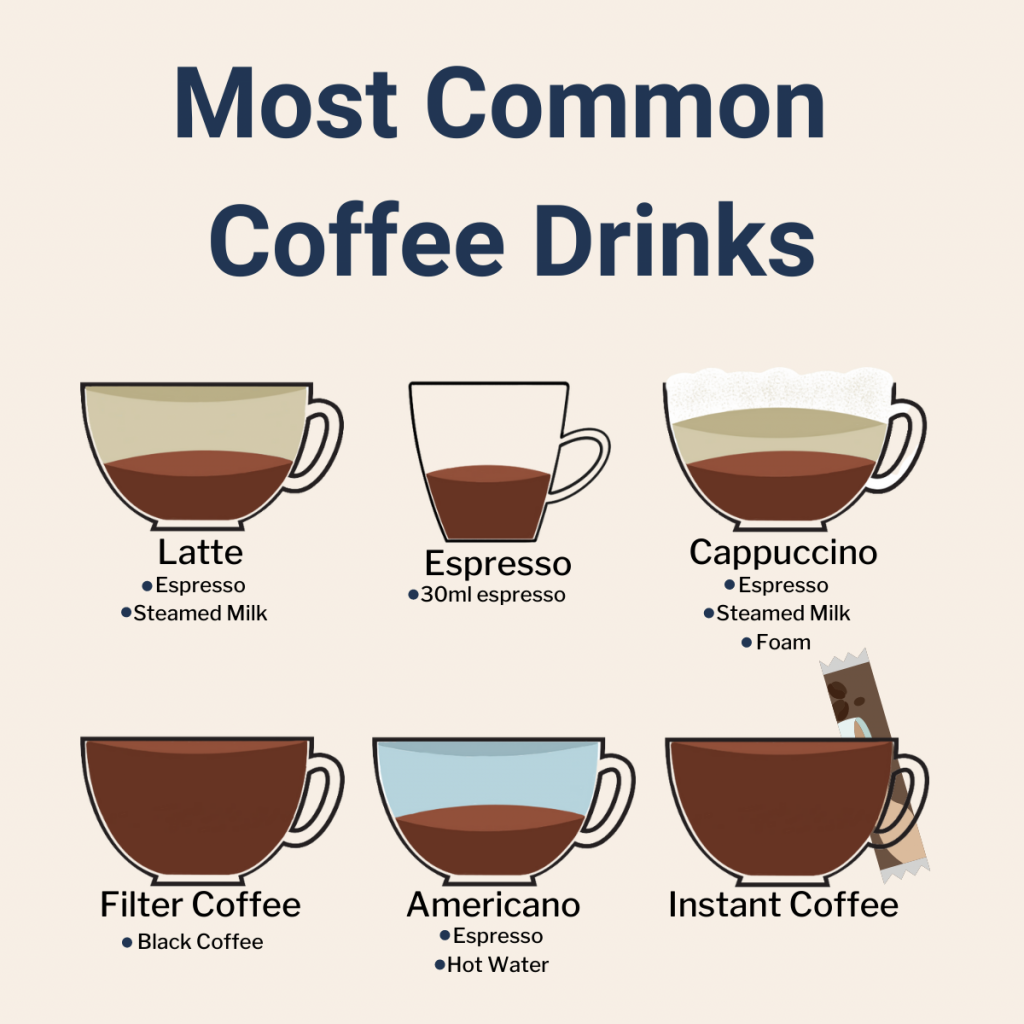
If you’re like most people, you probably don’t start your day without a cup of coffee. Whether you’re brewing your own or stopping by a coffeehouse on the way to work, a cup of caffeine can provide your body with a much-needed boost, and serves as the perfect life me up!
But, have you too struggled when placing your coffee order? The different types and names can often get overwhelming and confusing. Fret no more, as we help you understand your coffee better, so you place your next coffee order like a pro!

Types of Coffee
- Espresso Stronger than plain black coffee and made by forcing steam through ground coffee beans; also thicker than plain black coffee and used as the base for a variety of other coffee drinks
- Cappuccino One shot of espresso with equal parts of steamed milk and milk foam
- Caffe Latte One shot of espresso with three parts steamed milk
- Macchiato One shot of espresso with foam milk, often combined with multiple other flavors, such as caramel and vanilla
- Americano One shot of espresso with a cup of hot water, also known as a diluted espresso

- Flat White Equal parts espresso and steamed milk
- Caffe Mocha Chocolate syrup and whipped cream added to a caffe latte or a cappuccino
- Iced Coffee Coffee prepared black or with milk and then poured over ice; can also be made with milk foam or whipped cream or cold-brewed (meaning coffee beans are brewed in cold or room-temperature water for 12 to 24 hours) (9)
- Bottled Coffee Iced coffee served in a bottle.
Coffee is also more than just an energy booster. Contrary to popular belief, coffee has many health benefits too!
Health Benefits of Coffee

Energy Booster
Because a single cup of regular coffee contains about 95 mg of caffeine, it can help you feel less tired and increase your energy level. A study found that it may also have cognitive benefits, improving memory and mood.
Increases Calorie Burn
If you’re looking to drop a few pounds, coffee may give your body a metabolic boost. In one study, 100 mg of caffeine was found to increase the resting metabolic rate of volunteers by 3 to 4 percent. Another study supported these findings and found that metabolic rates increased almost immediately after coffee consumption and remained elevated for up to three hours.
Great For Your Liver
Both regular and decaf coffee seem to have a protective effect on your liver. Research shows that coffee drinkers are more likely to have liver enzyme levels within a healthy range than people who don’t drink coffee.
Helps Body Process Glucose Faster
That’s the theory behind studies that found that people who drink more coffee are less likely to get type 2 diabetes.
Risks Associated With Coffee

Although coffee has its benefits, the caffeine in coffee can have side effects. According to the Mayo Clinic, 400 mg of caffeine per day is a safe amount for most healthy adults. This is the equivalent of about 4 cups of regular coffee. Drinking more than this amount per day could cause a variety of side effects, such as:
- Restlessness
- Nervousness
- Trouble sleeping
- Frequent urination
- Headaches
- Fast heartbeat
- Upset stomach
- Muscle tremors
- Can be addictive
Excess of using anything is harmful to health, hence coffee should be consumed in moderation. People who are sensitive to coffee should reduce the amount they drink or switch to decaf.






